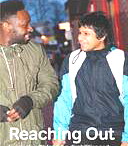Report: Reaching out to people with learning disabilities and families from BME Communities
 New guidance aims to tackle the inequalities experienced by people with learning disabilities from Black and Minority Ethnic communities.
New guidance aims to tackle the inequalities experienced by people with learning disabilities from Black and Minority Ethnic communities.
- Many Black and Minority Ethnic (BME) communities are still unaware of what learning disability support is available to them.
- Commissioners and practitioners need to be fully aware of the different concerns of particular Black and Minority Ethnic groups.
The Foundation for People with Learning Disabilities is launching a new report, commissioned by the Department of Health, to tackle the inequalities in health and social care, which continue to be experienced by people with learning disabilities and their families from Black and Minority Ethnic (BME) communities.
The report, Reaching out to people with learning disabilities and families from BME Communities, is complemented by two guides which provide practical guidance and tools that Local Authorities, practitioners and service providers can use in supporting families.
Recently there has been increasing talk of 'double discrimination' where both ethnicity and disability form a double barrier to those seeking care. People with learning disabilities from BME backgrounds can be subject to services that are not always culturally sensitive. This is often fuelled by unsound assumptions about what certain ethnic groups value, and is further compounded by a lack of knowledge as to where the families are. It was in this context that the Reaching out project was initiated.
The report found that local community organisations have a significant role to play in supporting people with learning disabilities and their families from BME communities. Local statutory agencies should examine their own policies and practices openly and honestly in order to eradicate any element of institutional racism that means people with learning disabilities from BME communities are worse off than others.
The following recommendations emerge from the project's findings:
- A person-centred approach that goes beyond health and social care is needed to embrace families as a whole.
- Families are not "hard to reach," they simply have to be identified and contacted.
- More attention should be given to the issues highlighted by families from BME communities
The project involved establishing and working with local groups that included third sector community-based organisations alongside statutory services. The aim was to build strong, sustainable local networks while at the same time accumulating important lessons and knowledge for wider dissemination.
The two complementary guides produced alongside the report include:
- Reaching out – Guidance for Practitioners from Social Care and Health Services in Developing Culturally Competent Practice
- Reaching out – Guidance for Families of People with Learning Disabilities and Practitioners in Developing Culturally Competent Planning
The report is available on: http://www.learningdisabilities.org.uk/publications/reaching-out-report/


 A guide aimed at helping disabled people and disability organisations to fight cuts to services in their local area has been updated to reflect important recent case law and to expand the list of solicitors willing and able to take on these cases.
A guide aimed at helping disabled people and disability organisations to fight cuts to services in their local area has been updated to reflect important recent case law and to expand the list of solicitors willing and able to take on these cases. The latest edition of our online journal, Better Breaks is now available.
The latest edition of our online journal, Better Breaks is now available.